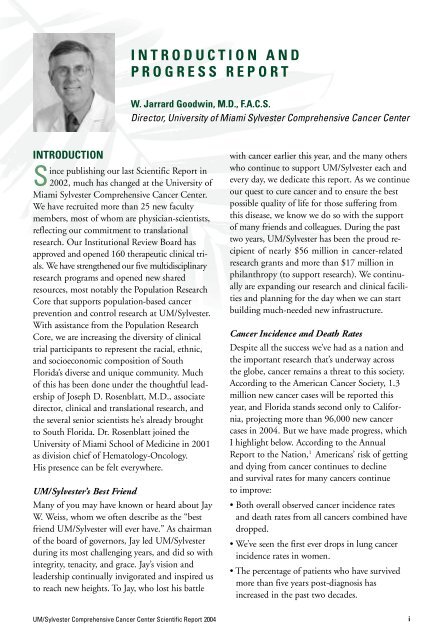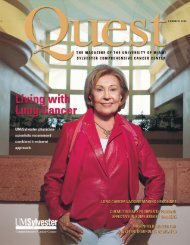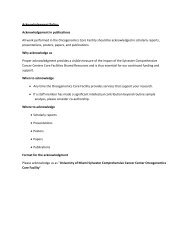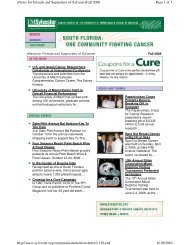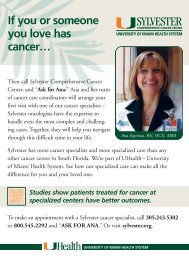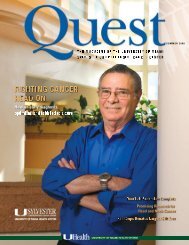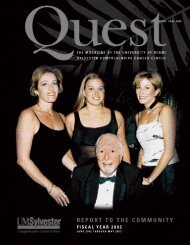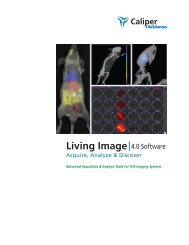SCIENTIFIC REPORT 2004 - Sylvester Comprehensive Cancer Center
SCIENTIFIC REPORT 2004 - Sylvester Comprehensive Cancer Center
SCIENTIFIC REPORT 2004 - Sylvester Comprehensive Cancer Center
You also want an ePaper? Increase the reach of your titles
YUMPU automatically turns print PDFs into web optimized ePapers that Google loves.
I N T R O D U C T I O N A N D P R O G R E S S R E P O R T<br />
I N T R O D U C T I O N A N D<br />
P R O G R E S S R E P O R T<br />
W. Jarrard Goodwin, M.D., F.A.C.S.<br />
Director, University of Miami <strong>Sylvester</strong> <strong>Comprehensive</strong> <strong>Cancer</strong> <strong>Center</strong><br />
INTRODUCTION<br />
Since publishing our last Scientific Report in<br />
2002, much has changed at the University of<br />
Miami <strong>Sylvester</strong> <strong>Comprehensive</strong> <strong>Cancer</strong> <strong>Center</strong>.<br />
We have recruited more than 25 new faculty<br />
members, most of whom are physician-scientists,<br />
reflecting our commitment to translational<br />
research. Our Institutional Review Board has<br />
approved and opened 160 therapeutic clinical trials.<br />
We have strengthened our five multidisciplinary<br />
research programs and opened new shared<br />
resources, most notably the Population Research<br />
Core that supports population-based cancer<br />
prevention and control research at UM/<strong>Sylvester</strong>.<br />
With assistance from the Population Research<br />
Core, we are increasing the diversity of clinical<br />
trial participants to represent the racial, ethnic,<br />
and socioeconomic composition of South<br />
Florida’s diverse and unique community. Much<br />
of this has been done under the thoughtful leadership<br />
of Joseph D. Rosenblatt, M.D., associate<br />
director, clinical and translational research, and<br />
the several senior scientists he’s already brought<br />
to South Florida. Dr. Rosenblatt joined the<br />
University of Miami School of Medicine in 2001<br />
as division chief of Hematology-Oncology.<br />
His presence can be felt everywhere.<br />
UM/<strong>Sylvester</strong>’s Best Friend<br />
Many of you may have known or heard about Jay<br />
W. Weiss, whom we often describe as the “best<br />
friend UM/<strong>Sylvester</strong> will ever have.” As chairman<br />
of the board of governors, Jay led UM/<strong>Sylvester</strong><br />
during its most challenging years, and did so with<br />
integrity, tenacity, and grace. Jay’s vision and<br />
leadership continually invigorated and inspired us<br />
to reach new heights. To Jay, who lost his battle<br />
with cancer earlier this year, and the many others<br />
who continue to support UM/<strong>Sylvester</strong> each and<br />
every day, we dedicate this report. As we continue<br />
our quest to cure cancer and to ensure the best<br />
possible quality of life for those suffering from<br />
this disease, we know we do so with the support<br />
of many friends and colleagues. During the past<br />
two years, UM/<strong>Sylvester</strong> has been the proud recipient<br />
of nearly $56 million in cancer-related<br />
research grants and more than $17 million in<br />
philanthropy (to support research). We continually<br />
are expanding our research and clinical facilities<br />
and planning for the day when we can start<br />
building much-needed new infrastructure.<br />
<strong>Cancer</strong> Incidence and Death Rates<br />
Despite all the success we’ve had as a nation and<br />
the important research that’s underway across<br />
the globe, cancer remains a threat to this society.<br />
According to the American <strong>Cancer</strong> Society, 1.3<br />
million new cancer cases will be reported this<br />
year, and Florida stands second only to California,<br />
projecting more than 96,000 new cancer<br />
cases in <strong>2004</strong>. But we have made progress, which<br />
I highlight below. According to the Annual<br />
Report to the Nation, 1 Americans’ risk of getting<br />
and dying from cancer continues to decline<br />
and survival rates for many cancers continue<br />
to improve:<br />
• Both overall observed cancer incidence rates<br />
and death rates from all cancers combined have<br />
dropped.<br />
• We’ve seen the first ever drops in lung cancer<br />
incidence rates in women.<br />
• The percentage of patients who have survived<br />
more than five years post-diagnosis has<br />
increased in the past two decades.<br />
UM/<strong>Sylvester</strong> <strong>Comprehensive</strong> <strong>Cancer</strong> <strong>Center</strong> Scientific Report <strong>2004</strong><br />
i


